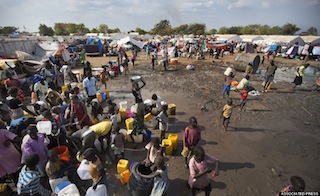Bahr el Ghazal governors vow to protect of Nuer community
December 30, 2013 (JUBA)- Governors from the Bahr el Ghazal region of South Sudan have said they will not allow individuals to exploit the ongoing unrest in the country and target members of Nuer ethnic community in areas under their jurisdictions.

Reports that Nuer civilians were targeted in the capital, Juba in the first days of the fighting led to reprisal attacks in in other parts of the country. Soldiers from the army have rebelled in Jonglei, Unity and Upper Nile state.
Efforts to bring the government and the rebels – led by former Vice President Riek Machar – together for peace talks have so far failed despite international calls for a ceasefire.
The governor of Western Bahr el Ghazal, Rizik Zachariah Hassan, told Sudan Tribune on Monday that he would not allow members of the Nuer tribe living in Bahr el Ghazal, where the Dinka are largest group.
“As leaders of this region, we will not entertain individuals exploiting this situation to settle their own squabbles and differences whatsoever the case. It will not happen. I have given orders that the members of Nuer community in Western Bahr el Ghazal State moves freely as it was before. This is part of their country,” Hassan said.
The Governor said that his colleagues in the other three states of Greater Bahr el Ghaza – Warrap, Lakes and Northern Bahr el Ghazal – have given similar directives to all county commissioners, administrative officers at the district and sub-district level, as well as traditional leaders.
President Salva Kiir has alleged that the fighting within the Presidential Guards that triggered the conflict was a coup attempt led by Machar and other members of the ruling SPLM, many whom were sacked from senior positions this year.
“When we met as the governors with the president after the incident [alleged coup attempt], we agreed to work for peace and unity among our people, regardless of their ethnic backgrounds. Especially us the leaders from Bahr el Ghazal, we agreed to do our best to provide necessary protection to all members of the Nuer community wherever they area in the region,” Hassan said.
“In Greater Bahr el Ghazal states we have already held briefings and told the public what exactly happened in Juba. We told them that it was simply an attempt by individuals to take power by force. These individuals are from all the states of South Sudan except this state (Western Bahr el Ghazal). So you see that the issue is not a tribal conflict as being reported in the media,” explained governor Hassan.
“You in the media need to reflect in your reports exactly what happened. People feel that you have not done your work,” he told Sudan Tribune.
“The real situation about what happened had not been out. Much of what the media reported is all about rumours and allegations which caused more confusion. You talk to the right people so that they give you correct information,” Hassan said.
Human Rights Watch and others have reported that civilians were targetted along ethnic lines during the first days of the conflict in Juba but this has been denied by the government.
Nyanut Ajiek, a native of Northern Bahr el Ghazal, presently living in Juba’s 107 residential area, said she had lost her husband in the bloodshed during the second day of the incident.
Politicians were trying to divide people along tribal lines for their own ends, she said.
“Before my husband was killed in this conflict, we used to live in perfect harmony with the members of other communities including from the Nuer community and we became one people. So I don’t believe that what happened was a conflict between the Nuer and the Dinka. It is a fight between politicians who wants to control resources and power.
“They are only using tribe to divide us and I call on our people not to accept. Our fathers and brothers did not fight as a tribe during the war with Sudan and we also did not vote during the referendum as a tribe, we all fought and voted as South Sudanese people.”
Ajiek says she has been put in the community crisis management, peace and reconciliation committee by the authorities, apparently to promote dialogue and harmony with her experience.
“I think religious leaders need to pray very hard for our leaders and this country. There are people who have never seen violence act as this. These people have now been terrified.”
Ajak, 31, added that her younger sister is married to a Nuer from Nasir in Upper Nile State and they both are now sheltering with their children at the UN camp in the area.
“The devil has taken control of our country,” she added.
The UN says that over 7,000 civilians, including vulnerable orphans, are going without food inside their camps amid concerns of a worsening humanitarian situation in the world’s youngest country.
(ST)
Read all Sudan Tribune‘s coverage of the crisis in South Sudan here:
The latest tweets on the crisis in South Sudan:
